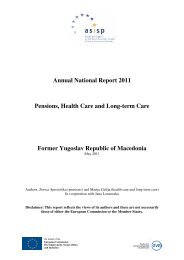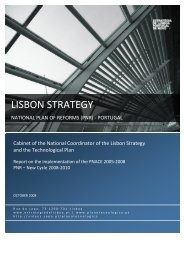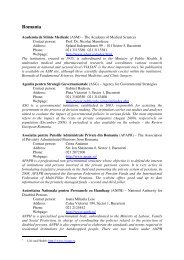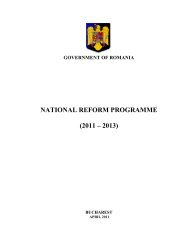National reform programme 2008-2010 Malta - European Commission
National reform programme 2008-2010 Malta - European Commission
National reform programme 2008-2010 Malta - European Commission
Create successful ePaper yourself
Turn your PDF publications into a flip-book with our unique Google optimized e-Paper software.
3.4 Manufacturing research projects: Three research projects are planned in relation to<br />
manufacturing research. These projects will involve industry-academia consortia<br />
working on common issues of relevance.<br />
3.5 State of the art ICT facility: Build a state-of-the-art facility to cater for a larger number of<br />
undergraduates, and to support a growing number of postgraduates and researchers in<br />
various areas of ICT.<br />
3.6 MGSS Postgraduate Scheme: to professionalise and build critical capacity in research<br />
and advanced education.<br />
3.7 Launch University of <strong>Malta</strong> Trust Fund.<br />
4.0 Pursue the fight against climate change<br />
4.1 Enhancing <strong>Malta</strong>’s capacity to mitigate and adapt to climate change: introduce a<br />
comprehensive national framework for climate change policy action in <strong>Malta</strong>, built on<br />
the results of scientific studies and assessment of international obligations and<br />
vulnerability of the country. As a result, a <strong>National</strong> Climate Change Strategy for <strong>Malta</strong>,<br />
disseminated nationwide and integrated in all major national policies, <strong>programme</strong>s and<br />
measures will be achieved.<br />
4.2 Promotion of Renewable Energy Sources in the Domestic & Commercial Sector :<br />
increase reliance on RES with the aim to diversify the fuel mix, reduce air pollution,<br />
reduce local dependence on polluting and costly fuel sources and ease economic<br />
burdens on domestic households and commercial enterprises.<br />
4.3 The introduction of tax incentives with a view to promote newer and cleaner commercial<br />
vehicles: businesses that make use of cleaner, newer and smaller vehicles will be taxed<br />
less than those which utilize older and less environmental friendly vehicles. Businesses<br />
thatopt to buy newer vehicles and vehicles that have cleaner technology will be charged<br />
less registration tax than older vehicles. Furthermore, the annual registration tax will<br />
vary according to the age of the vehicle, that is as the vehicle gets older, the annual<br />
circulation tax will increase. This is in line with the polluter pays principle.<br />
4.4 Reform in the Vehicle Registration Tax Regime: amend the motor vehicle registration<br />
tax and Annual Road Circulation tax to one based on the Polluter Pays Principle<br />
5.0 Better Regulation<br />
5.0 Strengthen the Better Regulation Unit: strengthen the Better Regulation Unit with a view<br />
to eliminate “red tape” whilst transforming services to business and citizens into “red<br />
carpet” treatment.<br />
5.1 Complete the current Action Plan for Simplification: Continue the implementation of the<br />
measures within the Action Plan for Simplification<br />
5.2 Carry out an intensive, sectoral based consultation to target the key pain points felt by<br />
businesses: Government believes that the next step is to take simplification to another<br />
level and consult with the various business sectors to obtain ‘on the ground’ feedback.<br />
A consultation plan has already been prepared by the BRU on this matter, which<br />
dissects the business community in a number of business sectors to facilitate the<br />
meetings.<br />
5.3 Put in place consultation guidelines and better practice for use within the public<br />
administration: build further on the consultation achievements to date by putting in place<br />
consultation guidelines and better practice for use within the public administration.<br />
5.4 Review the customer care systems within the public administration: implementation of a<br />
standardised customer care system in the wider public sector will possibly identify<br />
existing burdens on businesses and citizens. In particular recurring customer<br />
complaints can act as a source of further simplification.<br />
<strong>Malta</strong> <strong>National</strong> Reform Programme <strong>2008</strong>-<strong>2010</strong> - 84 -







